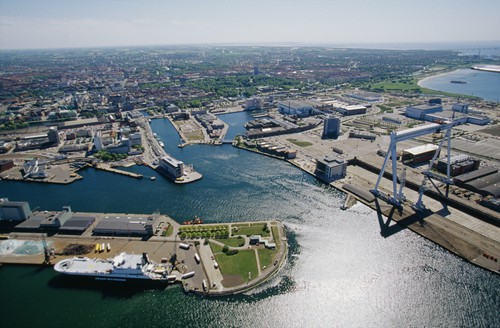
The ban follows a number of problems at the port concerning RDF being ineffectively moved from bulk vessels onto land, which has reportedly led to bales splitting and leaving waste strewn around the water’s edge.
But UK-based RDF exporters have voiced frustration that the restriction will have a “negative knock-on effect on legitimate, responsible operators” relying on shipments through the port.
A letter from Malmö city council to the company which operates the port – Copenhagen Malmö Port (CMP) – states that all piers at the port are prohibited from loading and unloading RDF wrapped in plastic bales “in bulk or in open handling”.
The document adds that RDF may only be transported into the port if it is “packed and sealed in such a way that this loading and unloading cannot spread in any regard to the environment, i.e. in closed containers, roof, floor and walls or similarly secure manner acceptable to environmental management”.
Violation of the ban can incur a 30,000 Swedish Krona (nearly £2,300), it states, but it does not state whether the restriction – which has been in place since late April – is temporary or permanent.

The document includes photos and reports from inspections carried out in September 2014 following complaints, which found defective packaging “often bursting at unloading so that the waste is spread over the vessel edge and dock and can easily blow away”.
The report also notes “bad smells” and plastic, electrical waste and empty motor oil packaging in some bales, with the wrapping “so bad that the bales are already broken during the unloading procedure”.
Malmö environmental inspector Marie Lecander did not confirm the names of either companies or countries at fault for the poor quality RDF, but told letsrecycle.com: “we’ve had problems with several RDF-waste shipments regardless of the country of origin.”
Although the document suggests sealed RDF transport methods are still permitted, Malmö is not so often used as a container shipping port, and so the ban has effectively halted all shipping of RDF directly into the city.
The ban will mostly affect those shipping into the port via smaller, coaster vessels and using stevedoring – usually through forklifts or cranes – to load and unload bales of material.

Many operators are now thought to be sending material into Sweden via the larger port at Gothenburg, which is several hours drive north of Malmö.
The majority of UK RDF exported to Sweden – which is one of the largest recipients of RDF from the UK – is shipped in via Gothenburg, which is the country’s busiest port and, unlike Malmö, has the capacity to accept large, sealed container vessels.
Sysav EfW
The Sysav energy from waste (EfW) plant – which is licensed to incinerate up to 630,000 tonnes of waste per year – is situated at Malmö, and its RDF suppliers are understood to include two of the UK’s largest RDF exporters Biffa and Suez Environnement.
According to a Biffa spokesman, though, the firm’s material is shipped in to Gothenburg before being transported by road down to Malmö, so the firm has not been affected by the ban.
Suez, meanwhile, said the ban would not a have an immediate impact on their operations, although it will “necessitate alternative logistics arrangements” for planned shipments later this year and that it was “currently working out an alternative solution with our offtake customer in Malmö”.
But the firm, formerly SITA UK, stressed that the Malmö restrictions were “categorically” not the result of Suez RDF operations, which are subject to “rigorous duty of care checks, quality control procedures and auditing across all of our production facilities and ports”.
A spokesman for Suez said: “The problems, we understand, have been caused by a small number of operators, mainly outside of England, which have produced low quality material with high leachate levels, contamination and poor bale construction. These problems have been exacerbated to some degree by improper stevedoring at the recipient port, resulting in split bales and spilled RDF.”
The company said its last shipment into the Port of Malmö was in October 2014 and that further shipments are not due to commence until September 2015.
‘Frustrating’
Andy Hill, market development director for alternative fuels at Suez, said: “It is frustrating that poorly produced RDF, from a small number of exporters, has in part led to the understandable restrictions we now see, which will undoubtedly have a negative knock-on effect on legitimate, responsible operators and offtake customers which rely on shipments through the Port of Malmö.
“As an industry, it is essential that everyone involved in the production, export, haulage and handling of RDF does so professionally and follows best practice to ensure that RDF material reaches its end destination safely and with no detrimental impact on the environment.”
Knock-on effect
There are also some industry fears that the restrictions at Malmö could mark the beginning of a wider clampdown on the import of foreign RDF into Sweden.
One RDF broker in Sweden, based at Helsingborg port just north of Malmö, told letsrecycle.com: “There has been a lot of discussion in Sweden at the moment about the import of waste – a lot of discussion in the papers about it. It is more a discussion about whether they should allow the import of waste and whether they should put taxes on the waste coming in.”
However, the RDF broker said that there had not been any official suggestion from Swedish authorities of a tax on RDF imports, adding that as Sweden’s large EfW plants need foreign feedstock to operate “it is very difficult to legislate at the moment”.










Subscribe for free